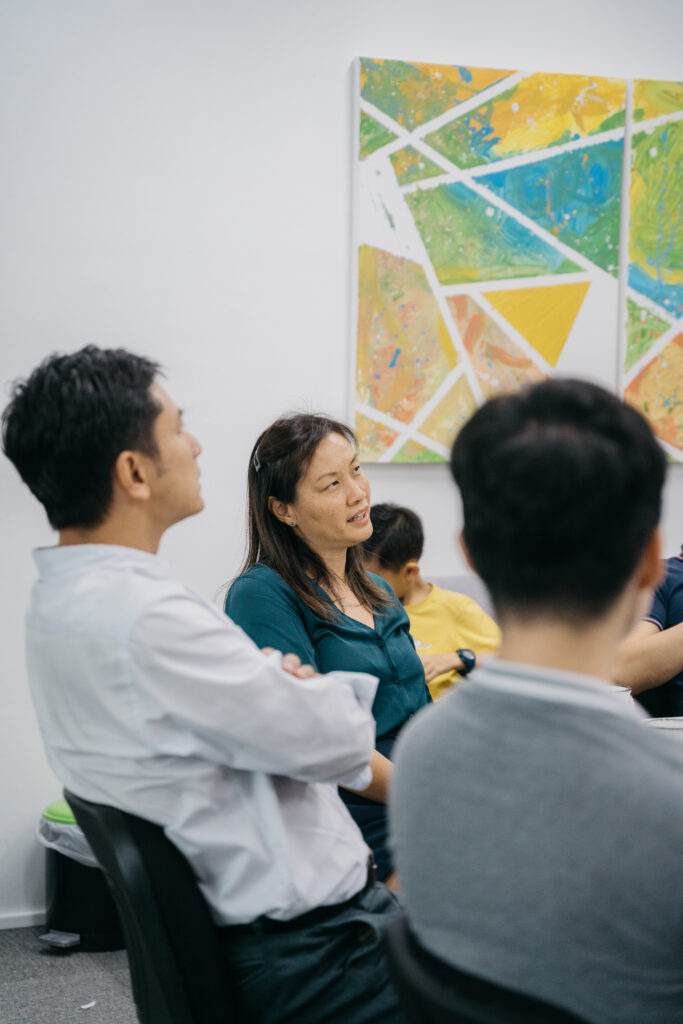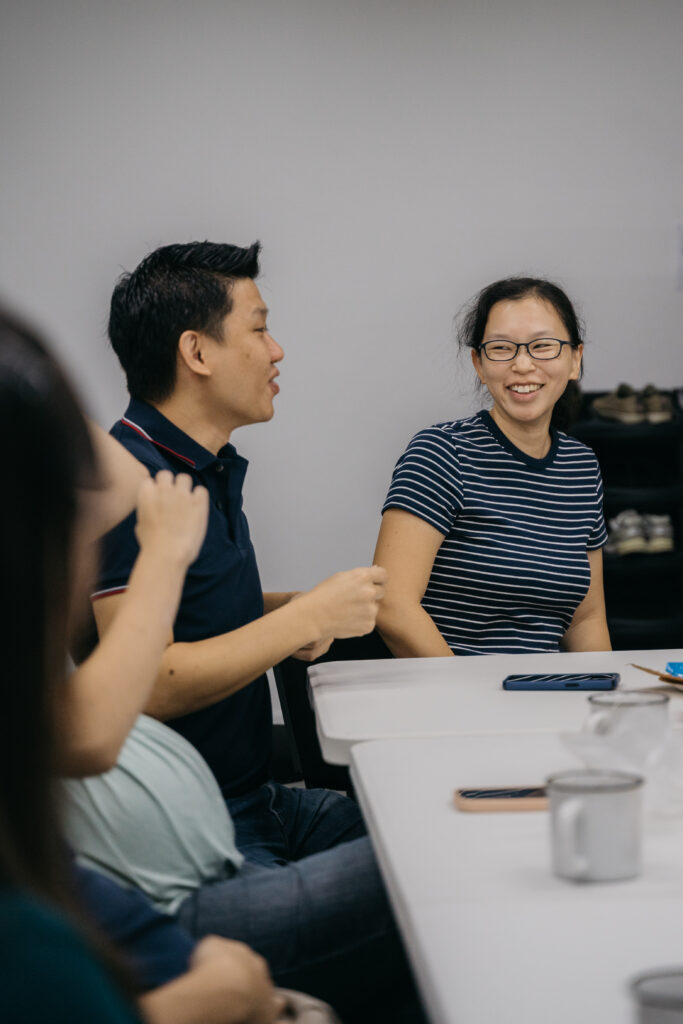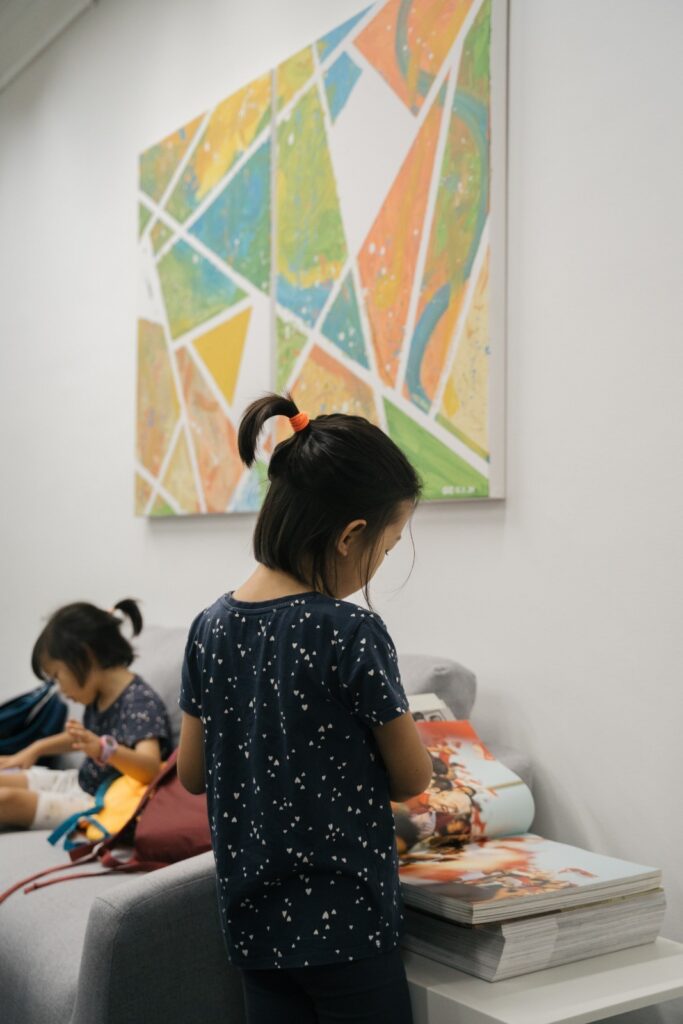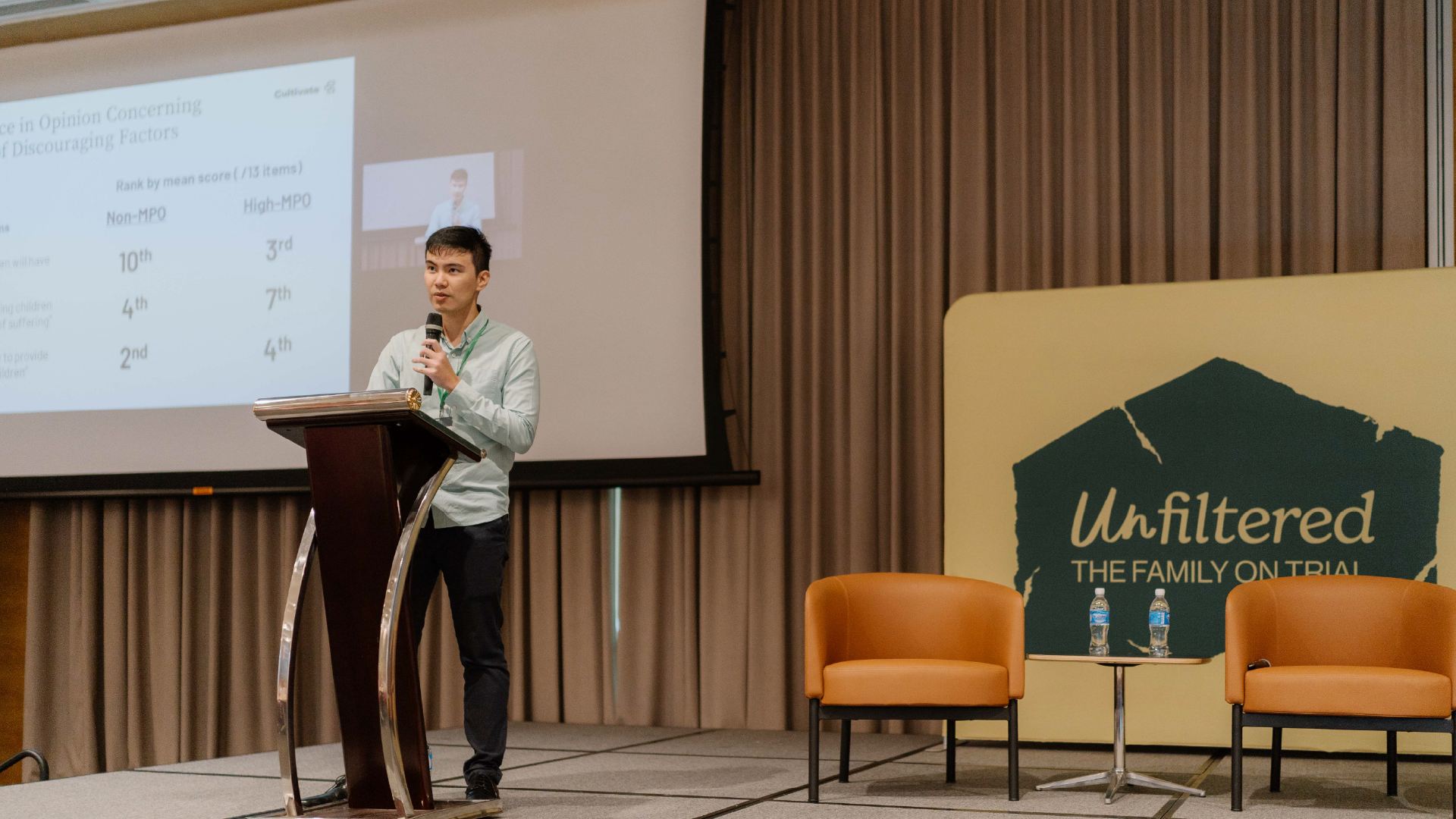“Is it the same wife?”
Everyone laughed as one of our Commune speakers, Tian Liang, shared about how his colleague reacted to news that he was having a fifth kid. He and his wife, Angela, parent five children aged 5 to 19 years. Together with another couple, James and Siling – parents of four children aged 1.5 to 9 – they were sharing about the joys and struggles of large families at May’s Commune.
Both couples faced many, and sometimes blunt, questions about their family. “People would ask us, are you very rich? How do you afford so many kids?” These questions were not unexpected, given how large families who were previously featured on mainstream media had received unsavoury comments accusing them of being financially irresponsible. And they were honest that it wasn’t easy. Large families meant having less space in their HDB flats, and having to carefully plan their finances. Both couples bonded over how their cars weren’t just vehicles, but extensions of their home, precious extra space. And each day brings a whole new range of emotions and needs, with children at such different stages of life, from toddlers to teenagers.
For the Tans, their fourth child came at a particularly difficult time. They had just returned from living long-term overseas, and their business had just failed. An extra mouth to feed brought extra stress. Yet Angela added, “If you look at them you might think of them as financial burdens, but I think they saved us, the joy that they brought, the reminders of how far we’ve come along.”

Tian Liang was also retrenched during Angela’s fifth pregnancy, but he pushed on. “I just had this belief that if I keep my head down and work hard, things will work out. There is no job I wouldn’t do.” Nonetheless, he was no stranger to dark and pessimistic thoughts about the future, reflecting on how living “in an urban prosperous society, we tend to want to control our destinies.” Yet so much of life is not within our control.

The Ongs also shared the sentiments of staying hopeful through this unpredictable life. Siling observed that James was often seen as “probably the most optimistic person around.” She added that “his attitude that everything will be okay,” anchors their family, especially through the trying times.

She recalled how James quit his job to spend time with his dad who had fallen critically ill. This angered his dad who scolded James for ‘squandering’ his time and not working to provide for his family. On hindsight, many around them praised him for his wisdom when his father passed months later, “whereas 4 months earlier, everyone said he was crazy” Siling said.
“As for me, I thought, what can I say to a man who was just trying to be a son to his father? Because as one generation loves, another generation learns.” Siling had wondered how long his joblessness would continue, and James’ reply was, “till the work is done”. James, who freelances so that he has time for his family, is aware of how their choices are atypical of Singaporeans. “It’s a conversation stopper!” Since their income is not stable, some of their children get financial assistance in school. Yet James added, “But I think, in doing so, we create different ways of looking at life, having different perspectives of what is truly important, and what is the purpose and meaning of life. We’re rich in different ways.”
Siling recounted how her first son, Nathaniel, struggled with comparing his life to other friends who shared about their travels while he had no memories of ever being on a plane (he was two on their last family holiday). Siling realised that his desire to “go on a plane” was because he wanted to have a new experience to share with his classmates, and after some suggestions, he was signed up for pottery class. She added that “he doesn’t throw a fit just because he doesn’t get something,” noting his maturity.
Siling then encouraged Nathaniel, to share one of his experiences with a classmate who had observed that he was receiving free books, uniforms, and meals in school. His classmate asked, “I don’t mean to insult you, but are you poor?” Nathaniel shared the rest of the exchange, “I said, ‘no, I’m not poor.’ He then asked me, ‘then why do you get all these things?’ I said, ‘I have more siblings, so the money that we have has to be shared among all of us. My parents believe that family life is very important, and parents should spend time with their kids.’ He asked me ‘is life hard, is it bad?’ I said ‘It’s not, it’s very good, I really enjoy myself at home. I think being able to spend time with my sisters, to have siblings is quite a happy thing for me.’”

Some were tearing as he ended, but it was not so much what he was saying but how sweet his spirit was – bearing truth to what his parents had sown into his life. Siling qualified that it wasn’t always easy, but while fights and arguments are common among the siblings, as with any other family, they learn to get along and to live with certain discomforts, such as noisy car rides.
James intentionally spends time with his children to help them each pursue their own individual purpose in life. “What are you living for?” he asks the small crowd in Commune. “In Singapore it’s not quite understood because we have this little factory line, this model that you send your kids to school, then they graduate, get a well-regarded job, etc.” But this was based on a particular definition of success – that children have to go to certain schools, achieve good results, land certain tiers of jobs, and so on. “So generally people don’t have kids because their definition of success limits them from thinking they can lead the children they have to success,” James said. We then agreed that Singapore was slowly moving away from this, with PM Wong’s commitment to encourage Singaporeans to embrace wider definitions of success.
But such government shifts aren’t likely to persuade people to have more children, which is now seen as a deeply personal choice, despite its wide societal effects (yes, we’re looking at the now-infamous low birth rates). It was their families that spoke the loudest – the dinners together, the time spent – people become open to having children or having more children because “they see it can be done.”
We ended off the session thinking over the deeper issue of how as a nation, Singapore has been professionalising care for each age group, especially those who aren’t in their prime. Children as young as 2 months can be placed in infant care, and it is the same way with seniors who can easily be placed in nursing homes. Singaporeans are always told, “people are our greatest asset” – but we are neither celebrating the young, nor the old – finding different ways and means to outsource care for them. That is the mindset that perhaps contributes to small families.

James and Siling would often get questioned about why they do not send their young ones to full day childcare. “It’s mayhem when everyone is home by 2pm. Of course they fight a lot, but it helps them learn to get along. As a result of that, Nathaniel is the mediator in his class. Families have to be together. It is uncomfortable at first, but it’s necessary.”
For example, after Siling’s mother had lung surgery, their third child was the only one who could get Siling’s mother to do the breathing exercises prescribed by her doctor. “My daughter was the only one she’d listen to. The nuclear family doesn’t work. When we moved out, our parents became empty nesters. As the kids came along, everyone’s households livened up.”
Siling added that “[w]e need to rethink this whole nuclear family. We keep building BTOs like that, everybody’s doors are shut. If you have a network, a village, they don’t need childcare. One person can cook lunch, and everybody goes over to eat etc. It can work. When kids are not close to each other or their family when they are younger, what happens when they’re adults and they’re still not close? We haven’t understood what kind of society we’d have. We’ve not really put a value to these relationships.”
While they don’t have all the answers, they made us ask hard questions, which we hope you will too. What does success look like? Who does our society value? How should we treat our elderly and our young? Are they assets or liabilities? In light of all these, how should we live? And of course, James’ question that keeps coming back to us, “what are you living for?”



